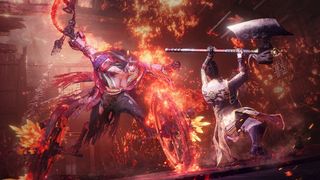Gaming
Explore Gaming
Latest about Gaming

Today's NYT Strands hints and answer: solutions to game #707, February 8
By Alan Martin last updated
We help you find today's Strands answers with some useful hints and tips to win.

Today’s Wordle hints and answer: February 8, 2026, solution #1,695
By Alan Martin last updated
Find out what today's Wordle hint and answer is and get some tips for it, plus see the solutions to previous games.

NYT Pips today hints and answers: February 7
By Scott Younker last updated
Get clues and answers for today's NYT Pips to keep your streak going.

NYT Connections today hints and answers for Saturday, February 7 #972
By Scott Younker last updated
Get today's NYT Connections clues and answers for today's puzzle #972 on February 7.

Intel Core G3 ‘Panther Lake’ handheld chips reportedly delayed — here’s why that’s bad news for gamers
By Tony Polanco published
A new report claims that the rumored Intel Core G3 "Panther Lake" chip for gaming handhelds has been delayed to Q2 of 2026. Here's what we've heard.

I tried the world's first gaming mouse with haptics — here's why Logitech G Pro X2 Superstrike is a game-changer
By Darragh Murphy published
I tried the Logitech G Pro X2 Superstrike with the world's first haptic trigger system, and it already brought me closer to esports-level click speeds. Here's what it's like.

Steam Machine delayed, as Valve will ‘revisit’ the cost because of the RAM price crisis
By Jason England published
The Steam Machine, Steam Frame and Steam Controller have all been delayed because of "memory and storage shortages."

The best handheld gaming consoles in 2026
By Jason England last updated
With the best handheld gaming consoles, you can play excellent games anywhere, whether you’re looking for action, puzzle or strategy games.
Here at Tom’s Guide our expert editors are committed to bringing you the best news, reviews and guides to help you stay informed and ahead of the curve!
 Club Benefits
Club Benefits












